
ABC Carnival '74
Across the Board
Baloney
Bamboozle
Be What You Want
Beat The Genius
Beat The Odds (1962)
Beat The Odds (1975)
Bedtime Stories
The Better Sex
The Big Money
The Big Payoff
Big Spenders
Blank Check
Body Language
Body Talk
The Buck Stops Here
Bullseye
Call My Bluff
Card Sharks (1996)
Casino
Caught in the Act
Celebrity Billiards
Celebrity Doubletalk
Celebrity Secrets
Celebrity Sweepstakes
Chain Letter (1964)
The Challengers (1974)
Change Partners
Child's Play
The Choice Is Yours
Combination Lock (1996)
Comedy Club
Concentration (1985)
The Confidence Game
Cop Out
Countdown (1974)
Countdown (1990)
The Couples Race
Crossword
Decisions, Decisions
Dollar a Second
Duel in the Daytime
The Fashion Show
Fast Friends
$50,000 a Minute
Finish Line (1975)
Finish Line (1990)
Get Rich Quick
Going, Going, Gone!
Head of the Class
High Rollers
Hollywood Squares (1965)
Hollywood Squares (1985)
The Honeymoon Game
Hot Numbers
Hot Potato
House to House
How Do You Like Your Eggs?
Jackpot (1984)
Jeopardy (1977)
Jokers Wild
Jumble
Key Witness
Keynotes (1986)
King of the Hill
Let's Make a Deal (1963)
Let's Make a Deal (1990)
The Love Experts
M'ama Non M'ama
Match Game (1962)
Match Game (1973)
Match Game (1990)
Match Game (1996)
MatchGame (2008)
Mindreaders
Missing Links
Monday Night QB
Money Words
Money in the Blank
Moneymaze
Monopoly (1987)
Nothing But the Truth
Now You See It (1986)
Oddball
100%
PDQ
Party Line
People On TV
Play For Keeps
Play Your Hunch
The Plot Thickens
Pot O' Gold
Pressure Point
The Price Is Right (1972)
Pyramid (1996)
Pyramid (1997)
A Question of Scruples
Quick as a Flash
Razzle Dazzle
Riddlers
Run For The Money
Says Who?
Scrabble (1990)
Second Guessers
Second Honeymoon
Sharaize
Shoot for the Stars
Shoot the Works
Shopping Spree
Show Me
Showoffs
Simon Says
$64,000 Question (2000)
Smart Alecks
Smart Money
Spellbinders
Spin-Off
Split Decision
Star Cluster
Star Play
Strictly Confidential
TKO
Talking Pictures (1968)
Talking Pictures (1976)
Tell It to Groucho
Temptation (1981)
$10,000 Sweep
Three of a Kind
Tic Tac Dough
Tie-Up
Top Secret
Twenty One (1982)
Twenty Questions
Twisters
Up and Over
The Waiting Game
We've Got Your Number
What Do You Want?
What's On Your Mind
Wheel of Fortune
Whew!
Whodunit
Whose Baby
Wipeout
Word Grabbers
Write Your Own Ticket
You Bet Your Life (1988)
You Bet Your Life (1991)
You're Putting Me On
Show a Random Pilot
Show Unreviewed Pilots
Bob Stewart Flow Chart
King of the Hill
Producer: Talent Associates/Norton in association with Castle Drive Productions
Host: Robert Earle
Announcer: Fred Foy
Taping Info: February 7, 1975, New York City
Made it to Air: No
Availability: Trading circuit
One of the trends of game shows in the seventies was to have massive sets. King of the Hill has that, and adds the complications of moving podiums. The show starts out as a quiz game but then becomes Card Sharks in the bonus round. Robert Earle, who had disappeared from national consciousness after the demise of G.E. College Bowl is your host.
The main game involves three players trying to answer questions in ten categories in order to reach "the King's Territory" where they will face a fourth player — the King of the Hill — in a head-to-head challenge to become champion. The first question of the game is a toss-up question between the three players in the category "Five in Common", where single items are read that have something in common. The player who answers the question correctly then continues to answer questions, moving up one level at a time, until they get one wrong. At that point, the question becomes a toss-up for the remaining two players.
One a player traverses the next five categories (The Name Game, Spelling, Initial Descriptions, Song Lyrics and What's Missing), the next category (Backwards) becomes a toss-up question. If the player at the sixth level answers it correctly, s/he moves up to play the King of the Hill in the final categories (two of which were Scrambled Phrases and Anagrams). There are three more levels before the challenger wins, and the player moves up one space for every correct question, but moves back if the question is answered incorrectly. There are only four questions in the final three categories, so once a category is exhausted of questions, the game is over and the King of the Hill defends their title.
The bonus game is straight out of Card Sharks. Except for the fact that this was first, and sometimes Goodson-Todman staffer Chester Feldman helmed this pilot, so it's probable that Card Sharks was the borrower. The player starts with $150, and wagers any or all of the money on the flip of the next card playing Acey-Deucey. Differences include that the Ace is low, a push is considered a win, and cards cannot be changed. A total of $19,200 would be available. Unlike on most Card Sharks players, the winner here took a lot of intelligent risks (i.e.: always betting at least 50%, since you have always have a greater than 50% chance of being right) and won some serious cash.
Overall, an enjoyable little game, so I'm at a little bit of a loss of why this show didn't sold. Robert Earle seemed fine as a host, but he never resurfaced on anything else after G.E. College Bowl, so there may have been some Earle-haters? Or, with shows being offered fast and furious, this one was just lost in the shuffle, since packager Talent Associates hadn't had a game show on the air in seven years? The world will never know.
A Pilot Light Bonus: Picture 1 and Picture 2 from cbsretirees.com of the set.
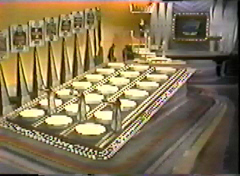 Here's the massive set. The hill is on the upper left, the hosts area is on the upper right. |
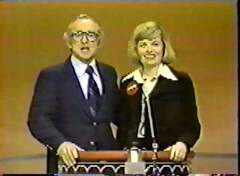 Host Robert Earle is on the left, flanking the current King of the Hill. |
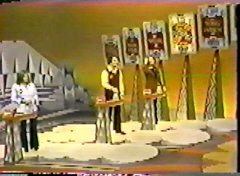 The ladder the players must go up. It would have been extra neat if the player was elevated up instead of having them just walk up. |
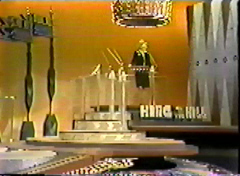 And here's the King's Kingdom. |
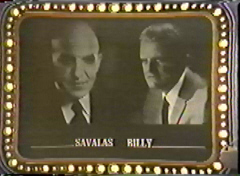 Here's a question from The Name Game category. Can you name this wacky combo of Telly Savalas and Billy Graham? |
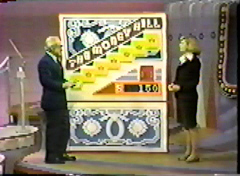 Here's the board for the bonus game. Earle didn't get the memo of what the game was called, since he kept on calling it "The High-Lo Game". |
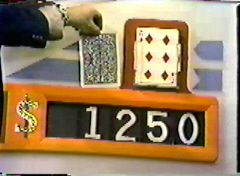 She's going to bet $1,000 on a six. The large card technology used in Card Sharks had not yet been developed. |
This pilot has been viewed 21079 times since October 6, 2008 and was last modified on Dec 12, 2009 14:46 ET
Feedback? Contact me at usgs-pilot at the usgameshows dot net domain